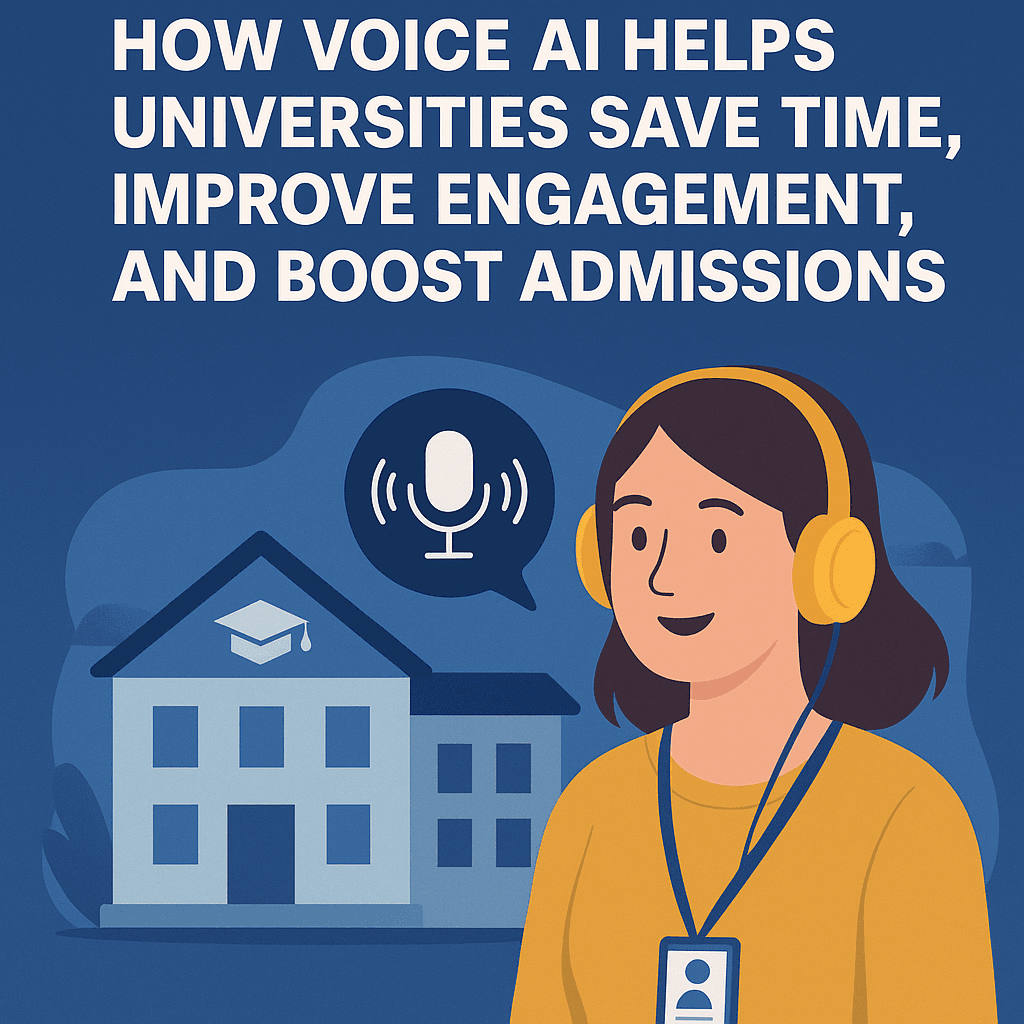
17 Nov 2025
Universities today are busier than ever. Thousands of students make calls every day inquiring questions about the admission deadlines, course details, scholarships and accommodation. However, the majority of calls are held on hold as the administrative staff could not cope with the number. This is where Voice AI comes in, a technology that is taking a silent revolution in the way universities communicate with students.
Imagine a student calling at 10 p.m. and asking about the status of his or her application and immediately receiving a friendly response. Or a foreign student who gets his/her own reminder on missing documents. This is the new reality powered by Voice AI- an intelligent system that can talk and listen as a real person would.
The future of voice automation in higher education is not about replacing people but about making them work smarter. AI voice assistants for students are proving to be freeing up a lot of staff time, increasing response time, and providing all students with the attention they warrant. Voice AI is becoming the invisible hand helping every university, from admission offices to counseling teams.
Voice AI is a technology that enables computers to comprehend human speech and react to it in a natural way in real-time. It integrates machine learning, speech recognition and language processing to make two-way conversations meaningful.
However, in colleges, it is not only a speaking robot but a computer companion that is aimed at making all the communication between a user and a machine individual and effective.
The following are the characteristics that render Voice AI really special in the education sphere:
Voice AI will not need any manual transfers or misunderstandings when a student calls about examination or admission, the AI will automatically redirect the student call to the right department or a counselor.
The system will verify the availability of the student, and that of the counselor and then make the meeting. It synchronizes the calendar immediately, so that it has no overlaps and slots missed.
Voice AI possesses one of the most popular features a natural, emotional tone. It greets properly, pauses like a real person and provides students with the perception of hearing.
Voice AI is 24/7 unlike the traditional offices which close at 6 p.m. It can be midnight or even a weekend but the students are able to get answers on the spot.
Voice AI allows universities to call more than 10,000 people simultaneously - ideal when it comes to sending admission, fee, or scholarship notices.
Not every call is relevant. Voice AI intelligently removes spam or half-baked leads so that counselors are only shown serious student inquiries.
Combining these characteristics, Voice AI is now among the most useful and effective AI solutions in the field of education. It is not merely automation, it is intelligent, emotional, and, incredibly useful to the contemporary universities.
How can we see how Voice AI is already changing the real-life situations in universities?
The same questions are frequently asked by the students, “When is the application deadline?” "What is the tuition fee?" When will results be announced? Rather than have employees wasting time and resources in responding to common questions, Voice AI can respond to them in a timely manner.
Voice AI is applied in universities to make proactive contact. It reminds the students of documents they have forgotten or dates of interviews or counseling appearance. By doing so, it will make sure that the students do not miss deadlines and that they will always be on track.
Take the case of a student, who claims that he or she wants to make a call with the admission counselor tomorrow at 3. The voice assistant student AI at once verifies the presence of a free meeting time slot in the calendar, authenticates the appointment, and creates a meeting.
Helplines tend to be congested during peak admission. Voice AI intervenes in the process of handling routine calls, allowing human counselors to attend to more emotive or complicated questions of students.
All these functions are even stronger when the universities apply the Voice AI of Edysor. It connects with Salesforce, HubSpot, WhatsApp, and Calendars and, that is, every student conversation will be linked with your system. Nothing falls through the cracks and no student feels overlooked, neglected or unnoticed.
The following is the reality - even the brightest Voice AI cannot be fully complete without a proper integration. To be effective indeed, it must have the ability to talk to other systems that are already in use by your university.
There is where Edysor Voice AI boasts.
It is linked directly to your CRM, so all student inquiries will be monitored, recorded, and automatically responded to.
All student information such as grades, documents, applications are available in real time, which provides the Voice AI with everything to discuss.
The task of setting up the appointment process is made easy, and the tedious process of booking manually is eliminated.
Through calls or chat, students are able to communicate with each other through voice or text; and voice or text is used by the Voice AI as well.
Through these integrations, voice automation in higher education is more than communication, it is an action engine that does not only respond to a question but also gets things done.
You may be asking yourself - how does a university start using Voice AI?
It may sound enormous, but the procedure is not as complicated as it may appear. This is the road map that Edysor tends to use in installing Service with Voice AI in an institution.
The team starts with a list of the typical questions that students have, e.g. regarding courses, fees, results, or scholarships, and puts them down in simple, natural language.
Then, the assistant is fed with current information- admission guides, frequently asked questions, and policies so that it never provides wrong answers. This page keeps on being updated so that the responses remain relevant.
The system is put into the real-life conditions before becoming operational, including background noise, other accents, and languages. This assists in achieving clarity and flexibility.
By following this simple roadmap, any institution can implement Voice AI in the easiest way possible and run the results within days, not months.
Security is not a choice when it comes to universities processing student information such as ID cards and money. Voice AI systems deal with confidential data, and Edysor ensures that all communication remains confidential and secure.
All calls are under GDPR regulation and FERPA. All data is retrieved in encrypted systems and students are informed prior to the recording of calls. That is, there will be no leaks, no surprises, and full transparency.
Such emphasis on compliance creates trust. Students are not afraid to provide the details and universities can concentrate on what is important which is to make the students succeed.
That is why the solution of Edysor is not only some other technological product, it is one of the safest AI education tools on the market.
Technology can only be helpful in a situation where it produces some measurable results. Universities can also monitor performance using clear, easy to understand metrics with the help of the Voice AI.
The number of queries by students that would be answered on the first attempt - a direct measure of efficiency.
The less time you call, the quicker your university is in serving students.
Students are able to rate their experience immediately - which allows you to know whether the tone, clarity, and helpfulness are as expected.
How many conversations lead to applications or visiting the campus- a good indicator of engagement.
Through these KPIs, universities are able to quantify the actual worth of voice automation in higher education using actual figures of speed, satisfied students and increased admissions.
The advantage of Voice AI is much greater than time saving.
Counselling teams and admissions can eventually relax. The system also manages monotonous calls and the staff is able to concentrate on real student relationships.
International programs are a great advantage as students who are in the time zone can receive immediate assistance.
Personalized voice message is warm compared to an email or chatbot. It can work towards a stronger emotional connection with the students.
Each interaction is documented and processed, and the universities have more information to enhance their communication practices.
It facilitates the fulfillment of the applications and enrollment of more students with quick responses, reminders, and convenient booking.
To the point, the implementation of Voice AI will be more than efficient, but it will change the face of the student experience.
It automates student calls, follow-up on admissions, and reminders of students - enabling universities to deal with the high call volumes without any problems.
2.Is Voice AI expensive?
Not at all. It is scalable in that the universities do not need big investments to start small and expand.3. Is it able to substitute human counselors?
No. Voice AI can lend a helping hand to human employees with repetitive requests, as counselors can work on customized advice.
3.How secure is Voice AI?
It is created in full compliance with GDPR and FERPA, which guarantees the encryption of data and its safe storage.
4.Is it possible to have voice AI that supports more than one language?
Yes. The majority of systems such as that of Edysor have provisions for multilingual communication to accommodate the international student populations.
5.How long does it take to set up?
It can be implemented within days using the onboarding steps of Edysor step-by-step; scripting questions to testing final results.
The world of education is changing and so is the way universities communicate. Voice AI has turned into the invisible hand between institutions and students, making sure that all questions are answered, every appointment is booked and every lead nurtured.
It is effective, understanding and accessible. Universities implementing the Voice AI are not merely following the technology trend but they are at the forefront of changing the way learning institutions interact, react, and evolve. Voice AI is what makes any conversation smarter, faster, and human, based on the admissions and the alumni. .
Resources
Others
All rights reserved. Powered by Edysor
